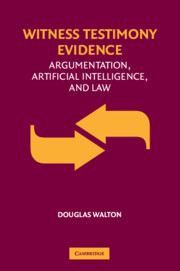Book contents
- Frontmatter
- Contents
- List of Figures and Tables
- Acknowledgments
- Introduction
- 1 Witness Testimony as Argumentation
- 2 Plausible Reasoning in Legal Argumentation
- 3 Scripts, Stories, and Anchored Narratives
- 4 Computational Dialectics
- 5 Witness Examination as Peirastic Dialogue
- 6 Applying Dialectical Models to the Trial
- 7 Supporting and Attacking Witness Testimony
- Bibliography
- Index
4 - Computational Dialectics
Published online by Cambridge University Press: 03 February 2010
- Frontmatter
- Contents
- List of Figures and Tables
- Acknowledgments
- Introduction
- 1 Witness Testimony as Argumentation
- 2 Plausible Reasoning in Legal Argumentation
- 3 Scripts, Stories, and Anchored Narratives
- 4 Computational Dialectics
- 5 Witness Examination as Peirastic Dialogue
- 6 Applying Dialectical Models to the Trial
- 7 Supporting and Attacking Witness Testimony
- Bibliography
- Index
Summary
Evaluating argumentation in a dialogue model, in which two parties reason with each other, is an old idea that goes back to Aristotle's earlier writings, and even to the sophists. But after the Greeks, the idea lost favor, although it persisted for a time in the scholastic disputations of the middle ages. Aristotle's syllogistic dominated the field of logic for many centuries, until it was superseded by other forms of deductive calculi – propositional and quantifier logics. It was not until the advent of the Erlangen School in Germany that anyone tried to revive the dialogue model and to carry out a systematic program for constructing a system of calculation based on it. But it was not until Hamblin's construction of mathematical models of dialogue (1970, 1971) that a general structure of logical dialogue systems was put forward that was well enough developed to show promise of providing methods for evaluating arguments and fallacies that would hold practical interest for logicians. Alexy (1989) showed how such dialogue systems can be applied to legal argumentation, a program that is now being carried forward by a group of researchers in AI and law including Bench-Capon (1995), Prakken and Sartor (1996, 1998), Verheij (1996, 2000), and Lodder (1998, 1999). This line of research is now often called computational dialectics. It would appear that Gordon invented the term.
- Type
- Chapter
- Information
- Witness Testimony EvidenceArgumentation and the Law, pp. 151 - 193Publisher: Cambridge University PressPrint publication year: 2007



